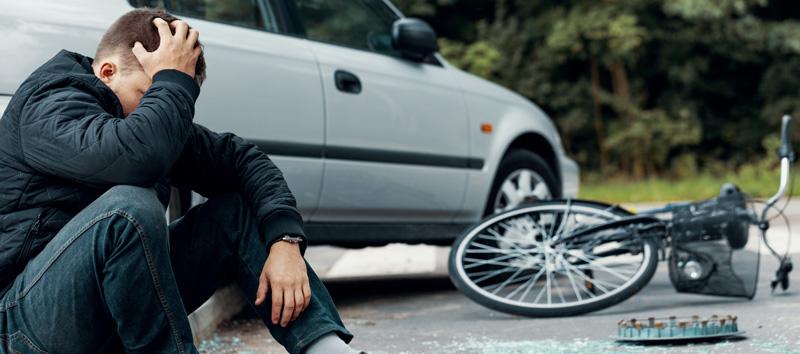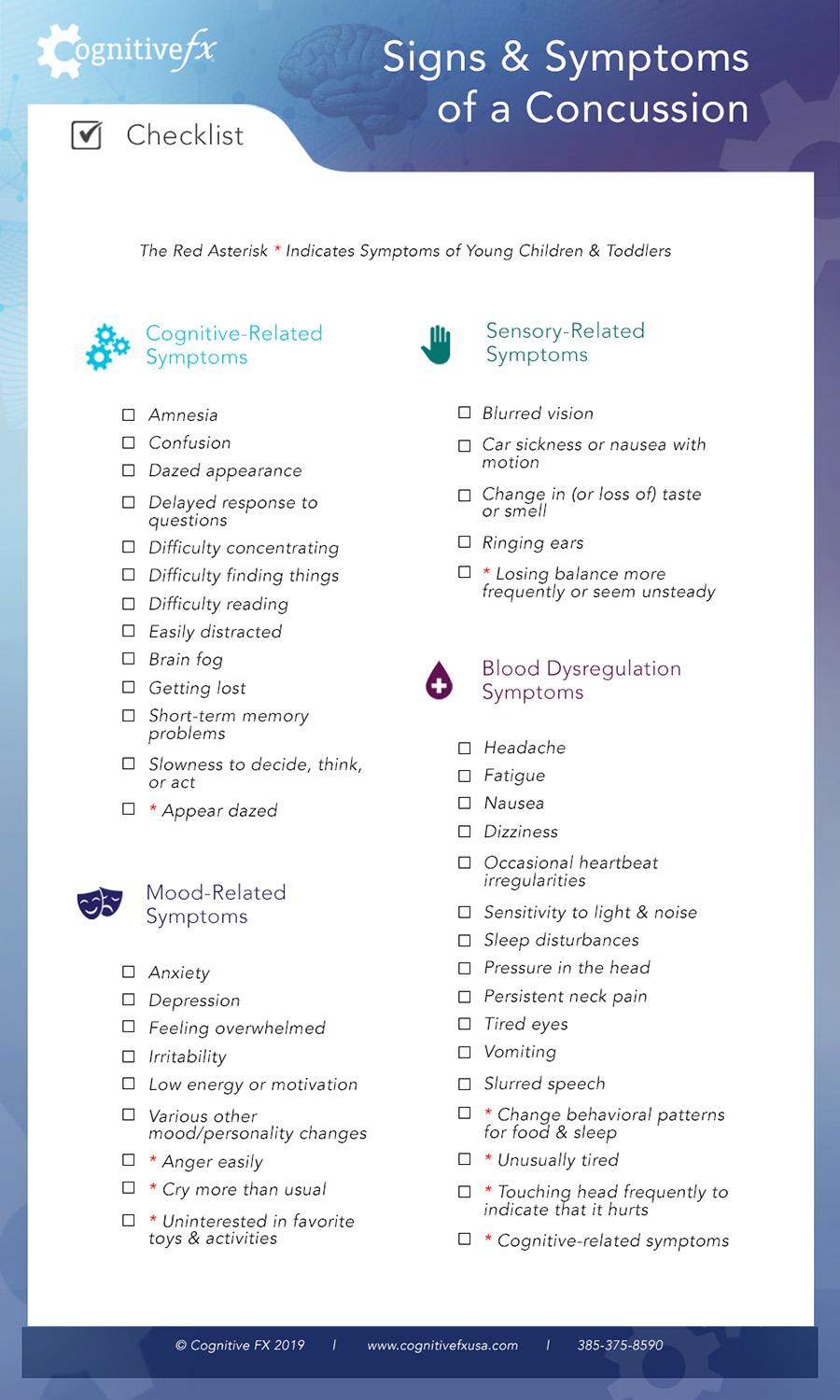How Would You Know if You a Concussion

How Do Yous Know If You lot Have a Concussion?
Concussions | Brain Injury Awareness | Traumatic Brain Injury | Brain Safety & Care
- Share:
If you've been reading near concussion diagnosis and symptoms and experience dislocated, that's pretty normal. Most communication about concussions feels vague. It's hard to know what applies to you. And if y'all're like about patients, you may be second-guessing yourself and unsure of whether to meet a physician after your injury. In this mail, nosotros'll endeavour to make information technology easier for you to know if you accept a concussion and what options you take. Along the fashion, we'll deflate some mutual myths about concussions and how y'all tin can tell if y'all accept ane. Hither'due south a sneak peek at what we'll cover: We'll explain what a concussion is in more than depth later on in this post, but for at present, we'll utilize this as a working definition: A concussion is a balmy traumatic brain injury sustained after a blow to the caput, whiplash, or jostling of the encephalon. That touch to the brain causes inflammation and may damage some brain cells. That injury and subsequent inflammation leads to concussion symptoms. Annotation: If you're experiencing symptoms that won't resolve after 1 or more than concussions, y'all're not alone and you're not crazy. On average, our patients improve by 75% after handling at our centre specializing in post-concussion therapy. To see if yous are eligible for handling, sign upwardly for a free consultation. In this first section, we'll address some mutual questions that all have the form of, "Tin I still have a concussion if ... ?" Some of them are tied to old myths about concussions, and some stem from misunderstandings that even many health care providers perpetuate today. Yes! Someone may have told you that it's not a concussion without loss of consciousness. Merely the reality is that your symptoms do not dictate whether or not you had a concussion. Yous don't have to have memory loss, fainting, or whatsoever other major issue for it to be considered a concussion. Just well-nigh 10% of concussion patients black out during their injury. The other 90% stay witting the whole fourth dimension! Yes, definitely. While many concussions are caused past a blow to the caput, you tin also get a concussion from whiplash or jostling. In those cases, the brain slams against your skull, temporarily damaging the cells and causing an inflammation response. Information technology's just as capable of causing symptoms as a physical hit to the head. For example, we've treated people who experienced whiplash during a car accident. They didn't hit their heads, merely the damage to their brains was very real. Or, say you're a figure skater, and your falls event in constant jostling of your brain. That could also issue in a encephalon injury, fifty-fifty if y'all didn't striking your caput on the ice. Mild or no symptoms does not mean y'all don't take a concussion. Some people don't observe their symptoms immediately. And the symptoms may not exist farthermost — it'due south possible that you lot'll only feel a mild headache and moderate fatigue for a few days before getting back to normal, for instance. Say you bump your head and experience totally fine afterward, and the people y'all're with don't notice whatever odd behavior. It's probably not a concussion, simply still has a chance of beingness one (especially if you've had brain injuries earlier). Sometimes, when the brain is injured, you may not feel symptoms immediately. Every brain reacts differently, so information technology's important to continue an center on how you feel for several days after a accident to the caput. Likewise, keep in heed there'southward no such thing as a "modest" concussion. Every concussion is, in technical terms, a mild traumatic brain injury. What makes information technology a "bad" concussion or not mainly depends on how much your brain is affected and how bad your symptoms are. Yeah. Almost of the time, your optics will not be a reliable source of diagnosis. That said, some baseline tests include eye-movement tracking that is capable of detecting a concussion. Unfortunately, baseline tests are not helpful unless yous've taken them before your concussion. More on that in a bit. So can your eyes ever point brain damage? They might. If both pupils are dilated, that could simply be your torso'southward normal response to a stressful situation. If one pupil is dilated more than the other, that could signal more serious brain trauma. Information technology's worth seeing a doctor immediately to rule out a traumatic brain injury. Yes! Most regular MRI and CT scans will not show concussion damage. They're simply not designed to detect concussion damage. Remember of it this fashion: Imagine you lot're looking into the window of a company. The lights are on, the building is intact, and the workers are present. Externally, it seems like the visitor is running well. But for the purposes of our example, we'll say that the workers don't get along, the company's finances take been mismanaged, and the CEO just resigned amid a scandal. It's actually not doing well at all. The view yous get of the visitor by looking at appearances (i.e., is the building there, are at that place people in it, etc.) is like looking at your brain with a regular MRI: It can verify that your brain structures are nowadays and undamaged. Merely a regular MRI can't tell you how well that encephalon is using its resource and whether your neurons are communicating the way they need to (i.e., are the employees collaborating, is the CEO leading them well, etc.). For that, you'd need an fNCI — a test nosotros'll talk nearly more in a following section. So what should you look for if you retrieve y'all take a concussion? If yous ... ... then information technology's likely (but not guaranteed) you take a concussion. Let's talk over which symptoms you tin can get from a concussion, forth with how doctors can evaluate patients when a concussion is suspected. Possibly you were driving without a seatbelt when you got into a car crash. Mayhap it's a sports injury. Maybe you tripped and slammed your head on the counter. Or peradventure you got knocked around at the roller coaster park. From the virtually frightening to the most inglorious methods of getting a concussion, the answer is the same: You cannot have a concussion unless you lot striking your caput, experienced whiplash, or jostled your brain enough for it to crash confronting your skull. If you did experience one of those three causes of head injuries, then your chances of having a concussion are loftier. That said, some situations are more likely to result in serious brain injury than others. Crash into a tree snowboarding? Hit your head in a motor vehicle accident? Autumn off a balcony? Those situations — and others like them — are more likely to result in a severe traumatic brain injury than, say, getting tackled during football. But having a less terrifying hit to the head doesn't mean yous should permit your guard downwardly. If yous experience whatever symptoms of a astringent traumatic brain injury (listed hither), seek medical attention immediately. We've written an extensive guide to concussion symptoms, so we won't rehash everything here. Here'due south the short version: As you can see from the chart, in that location are many unlike kinds of symptoms of a concussion (which makes sense when you consider that your brain controls everything yous practise!). Y'all might experience remainder issues, overwhelm, and memory problems, while someone else might have headaches, blurry vision, and personality changes. And in young children, symptoms don't look the same either (see items starred with an asterisk in the chart) considering they can't limited what they feel besides as we tin can. Doctors consider the symptoms you're experiencing in light of your medical history. If you had it prior to caput trauma — for example, low — merely information technology got worse afterwards a head injury, then you should mention information technology likewise. In that location is no gilt standard when information technology comes to concussion testing. Many doctors, for lack of ameliorate options, will gild an MRI or a CT scan. Unfortunately, neither of these tests can reliably detect a concussion, although they can dominion out more than serious causes of your symptoms. For example, if you lot take a tumor, brain bleed, or aneurysm, the scans should find that. If information technology's been several months after your injury and you're still experiencing symptoms, and then nosotros recommend a test nosotros utilise at Cognitive FX: functional neurocognitive imaging (fNCI). It'south a special kind of functional MRI that looks at how your brain uses its resources in response to stimuli. This is every bit opposed to a regular MRI, which but looks at brain construction. It wouldn't thing what you were thinking of when you lot got the standard MRI, the results would be the same. Merely for a functional MRI, the browse volition modify dramatically based on which regions of your encephalon are currently active. This distinction is disquisitional. During the fNCI nosotros administer, patients complete a ready of six cognitive tasks. We use the scans to see which encephalon regions are involved in those tasks. Post-concussion patients exhibit clear patterns of hyperactivity or hypoactivity in the brain regions affected by their injury. When patients run into established criteria, nosotros tin can say with a great degree of certainty that they suffer from post-concussion syndrome. To learn more about other tests used during post-concussion diagnosis, please run into our article on tests for post-concussion syndrome. If yous play contact sports (or are in other situations that increase your likelihood of sustaining a concussion), y'all could complete a baseline examination. A baseline test establishes what your normal functioning level is. It normally involves some basic cognitive and reaction time tests and may also involve some residual testing. If y'all go a concussion later on taking a baseline exam, you can retake the test immediately after injury. If your scores get down significantly, and then it'due south likely from your concussion. That said, the test isn't perfect — if it isn't administered in exactly the aforementioned way, for example, yous might not become accurate results. Some of the best baseline tests include an heart-tracking cess. It's worth seeing if a clinic in your expanse offers baseline testing with that included. But again, baseline testing is only helpful if you do it before your concussion. Afterwards your concussion, it's also tardily to be useful. If you think you have a concussion, information technology'due south of import not to return to normal life activities right away. The all-time recovery regimens involve a rest of exercise, light activity, and rest. Y'all can slowly scale up to your previous schedule based on symptoms. You lot may as well desire to come across a doctor, both for diagnosis and for aid navigating recovery. In this section, we'll go over some pointers for recovery, forth with when to see a doc. If you sustained a concussion playing sports, practice not render to play until y'all take fully recovered from your concussion. People who have sustained one concussion are more susceptible to getting another, especially when they haven't yet recovered from the first. Although rare, you would likewise adventure 2nd impact syndrome, a fatal condition caused in a small pct of people who sustain a 2nd concussion while not yet recovered from the beginning. Bated from that, the worst matter you lot can do is something called "cocooning." Cocooning involves resting all mean solar day in a dark room while avoiding all activity (including screens). Many well-meaning doctors notwithstanding give this medical advice because it's what they were taught in school. But research over the past decade has shown that cocooning tin actually increase your likelihood of long-lasting symptoms. Here'due south what yous can do instead: Do your best to get plenty of slumber (simply if you accept a difficult time sleeping, yous're not alone — it's a common symptom. This post might help.) We describe the astute concussion recovery process in depth in this postal service on how to treat a concussion. If you'd like extra guidance on how to piece of work out safely, y'all can read our guide to post-concussion practise. Seeing a doc is non always necessary if yous've had a concussion. That said, it depends on your tolerance for gamble: If y'all want to be absolutely sure that you haven't sustained a worse injury than a concussion, run into a medico. If y'all have unevenly enlarged pupils, or any other symptoms of a astringent traumatic brain injury, you lot should seek medical attending immediately. Here are some of the astringent TBI symptoms listed by the NIH: Otherwise, going to the doctor really depends on what you lot need. If your symptoms are mild and you have someone at home to sentinel over you, then seeing a healthcare professional may be unnecessary. If it's been a few weeks since your injury and yous're all the same experiencing symptoms, it may be time to consider a concussion handling clinic. Nosotros've written a full post on how to find a good clinic that you can apply in your search. Post-concussion syndrome is when you have long-lasting symptoms later on a balmy traumatic encephalon injury. Most of the time, these symptoms will not get away without handling. The status can be permanent, but afterwards treatment at our clinic, 95% of our patients experience statistically verified restoration of encephalon function. To learn more about how nosotros can aid you lot, sign up for a gratis consultation with our medical staff.
Tin can I Still Accept a Concussion If ... ?

... If I Didn't Black Out?
... If I Didn't Hit My Head?
... If I Feel Fine the Side by side Day?
... If My Eyes Didn't Evidence Whatever Change?
... If the MRI or CT Browse Didn't Testify Anything?
What Are the Signs of a Concussion?

How You Striking Your Head: Does It Matter?
Common Symptoms of Concussion

Concussion Tests
Baseline Testing
If I Have a Concussion, What Should I Practise?

Active Recovery
Visit a Doctor
What If My Symptoms Don't Get Away?

Virtually Dr. Mark Allen PhD
Mark D. Allen earned a PhD in Cerebral Science at Johns Hopkins University with post-doctoral preparation in Cognitive Neuroscience and Functional Neuroimaging at the University of Washington. He has fifteen years of inquiry and clinical experience in fMRI, with 22 publications in tier-1 peer-reviewed scientific journals, iii book chapters, and dozens of presentations at scientific and professional conferences in neuroscience, neuroimaging, and neuropsychology. Having collected and analyzed fMRI data from over 1,000 experimental subjects and over 300 clinically-referred patients, Dr. Allen is a pioneer and expert in the development of fMRI for utilise in clinical settings.
hornbergeraffen1947.blogspot.com
Source: https://www.cognitivefxusa.com/blog/how-do-you-know-if-you-have-a-concussion
0 Response to "How Would You Know if You a Concussion"
Postar um comentário